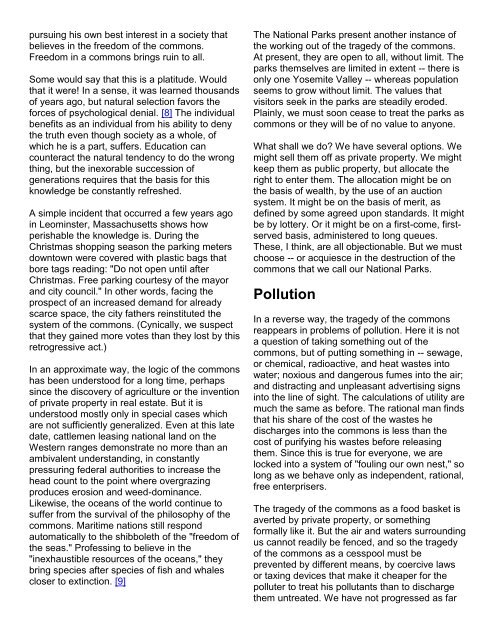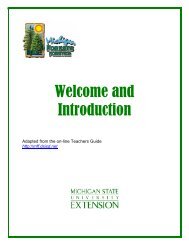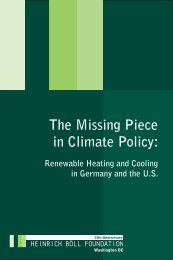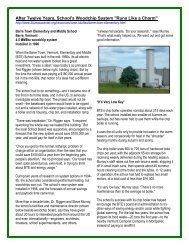The Tragedy of the Commons What Shall We Maximize?
The Tragedy of the Commons What Shall We Maximize?
The Tragedy of the Commons What Shall We Maximize?
Create successful ePaper yourself
Turn your PDF publications into a flip-book with our unique Google optimized e-Paper software.
pursuing his own best interest in a society thatbelieves in <strong>the</strong> freedom <strong>of</strong> <strong>the</strong> commons.Freedom in a commons brings ruin to all.Some would say that this is a platitude. Wouldthat it were! In a sense, it was learned thousands<strong>of</strong> years ago, but natural selection favors <strong>the</strong>forces <strong>of</strong> psychological denial. [8] <strong>The</strong> individualbenefits as an individual from his ability to deny<strong>the</strong> truth even though society as a whole, <strong>of</strong>which he is a part, suffers. Education cancounteract <strong>the</strong> natural tendency to do <strong>the</strong> wrongthing, but <strong>the</strong> inexorable succession <strong>of</strong>generations requires that <strong>the</strong> basis for thisknowledge be constantly refreshed.A simple incident that occurred a few years agoin Leominster, Massachusetts shows howperishable <strong>the</strong> knowledge is. During <strong>the</strong>Christmas shopping season <strong>the</strong> parking metersdowntown were covered with plastic bags thatbore tags reading: "Do not open until afterChristmas. Free parking courtesy <strong>of</strong> <strong>the</strong> mayorand city council." In o<strong>the</strong>r words, facing <strong>the</strong>prospect <strong>of</strong> an increased demand for alreadyscarce space, <strong>the</strong> city fa<strong>the</strong>rs reinstituted <strong>the</strong>system <strong>of</strong> <strong>the</strong> commons. (Cynically, we suspectthat <strong>the</strong>y gained more votes than <strong>the</strong>y lost by thisretrogressive act.)In an approximate way, <strong>the</strong> logic <strong>of</strong> <strong>the</strong> commonshas been understood for a long time, perhapssince <strong>the</strong> discovery <strong>of</strong> agriculture or <strong>the</strong> invention<strong>of</strong> private property in real estate. But it isunderstood mostly only in special cases whichare not sufficiently generalized. Even at this latedate, cattlemen leasing national land on <strong>the</strong><strong>We</strong>stern ranges demonstrate no more than anambivalent understanding, in constantlypressuring federal authorities to increase <strong>the</strong>head count to <strong>the</strong> point where overgrazingproduces erosion and weed-dominance.Likewise, <strong>the</strong> oceans <strong>of</strong> <strong>the</strong> world continue tosuffer from <strong>the</strong> survival <strong>of</strong> <strong>the</strong> philosophy <strong>of</strong> <strong>the</strong>commons. Maritime nations still respondautomatically to <strong>the</strong> shibboleth <strong>of</strong> <strong>the</strong> "freedom <strong>of</strong><strong>the</strong> seas." Pr<strong>of</strong>essing to believe in <strong>the</strong>"inexhaustible resources <strong>of</strong> <strong>the</strong> oceans," <strong>the</strong>ybring species after species <strong>of</strong> fish and whalescloser to extinction. [9]<strong>The</strong> National Parks present ano<strong>the</strong>r instance <strong>of</strong><strong>the</strong> working out <strong>of</strong> <strong>the</strong> tragedy <strong>of</strong> <strong>the</strong> commons.At present, <strong>the</strong>y are open to all, without limit. <strong>The</strong>parks <strong>the</strong>mselves are limited in extent -- <strong>the</strong>re isonly one Yosemite Valley -- whereas populationseems to grow without limit. <strong>The</strong> values thatvisitors seek in <strong>the</strong> parks are steadily eroded.Plainly, we must soon cease to treat <strong>the</strong> parks ascommons or <strong>the</strong>y will be <strong>of</strong> no value to anyone.<strong>What</strong> shall we do? <strong>We</strong> have several options. <strong>We</strong>might sell <strong>the</strong>m <strong>of</strong>f as private property. <strong>We</strong> mightkeep <strong>the</strong>m as public property, but allocate <strong>the</strong>right to enter <strong>the</strong>m. <strong>The</strong> allocation might be on<strong>the</strong> basis <strong>of</strong> wealth, by <strong>the</strong> use <strong>of</strong> an auctionsystem. It might be on <strong>the</strong> basis <strong>of</strong> merit, asdefined by some agreed upon standards. It mightbe by lottery. Or it might be on a first-come, firstservedbasis, administered to long queues.<strong>The</strong>se, I think, are all objectionable. But we mustchoose -- or acquiesce in <strong>the</strong> destruction <strong>of</strong> <strong>the</strong>commons that we call our National Parks.PollutionIn a reverse way, <strong>the</strong> tragedy <strong>of</strong> <strong>the</strong> commonsreappears in problems <strong>of</strong> pollution. Here it is nota question <strong>of</strong> taking something out <strong>of</strong> <strong>the</strong>commons, but <strong>of</strong> putting something in -- sewage,or chemical, radioactive, and heat wastes intowater; noxious and dangerous fumes into <strong>the</strong> air;and distracting and unpleasant advertising signsinto <strong>the</strong> line <strong>of</strong> sight. <strong>The</strong> calculations <strong>of</strong> utility aremuch <strong>the</strong> same as before. <strong>The</strong> rational man findsthat his share <strong>of</strong> <strong>the</strong> cost <strong>of</strong> <strong>the</strong> wastes hedischarges into <strong>the</strong> commons is less than <strong>the</strong>cost <strong>of</strong> purifying his wastes before releasing<strong>the</strong>m. Since this is true for everyone, we arelocked into a system <strong>of</strong> "fouling our own nest," solong as we behave only as independent, rational,free enterprisers.<strong>The</strong> tragedy <strong>of</strong> <strong>the</strong> commons as a food basket isaverted by private property, or somethingformally like it. But <strong>the</strong> air and waters surroundingus cannot readily be fenced, and so <strong>the</strong> tragedy<strong>of</strong> <strong>the</strong> commons as a cesspool must beprevented by different means, by coercive lawsor taxing devices that make it cheaper for <strong>the</strong>polluter to treat his pollutants than to discharge<strong>the</strong>m untreated. <strong>We</strong> have not progressed as far






